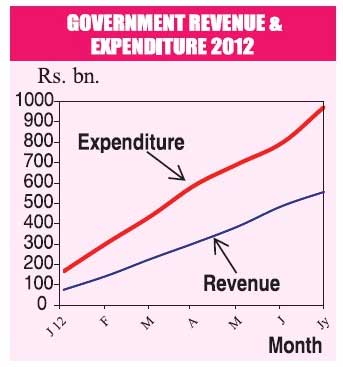02 Oct 2012 - {{hitsCtrl.values.hits}}
 Despite an increase in government revenue during the first seven months of 2012, the current expenditure of the government rose significantly compared with the previous year, signalling that the government may not be able to meet its budget deficit target of 6.2 percent of the Gross Domestic Product (GDP).
Despite an increase in government revenue during the first seven months of 2012, the current expenditure of the government rose significantly compared with the previous year, signalling that the government may not be able to meet its budget deficit target of 6.2 percent of the Gross Domestic Product (GDP). Meanwhile, total domestic debt of the government in the first seven months also rose to Rs.3185.7 billion against Rs.2755 billion in the first seven months of 2011. Total foreign debt during the seven months amounted to Rs.2975.3 billion up from Rs.2220.2 billion in the first seven months of 2011.
Meanwhile, total domestic debt of the government in the first seven months also rose to Rs.3185.7 billion against Rs.2755 billion in the first seven months of 2011. Total foreign debt during the seven months amounted to Rs.2975.3 billion up from Rs.2220.2 billion in the first seven months of 2011.
01 Jan 2025 6 hours ago
31 Dec 2024 8 hours ago
31 Dec 2024 8 hours ago
31 Dec 2024 31 Dec 2024
31 Dec 2024 31 Dec 2024